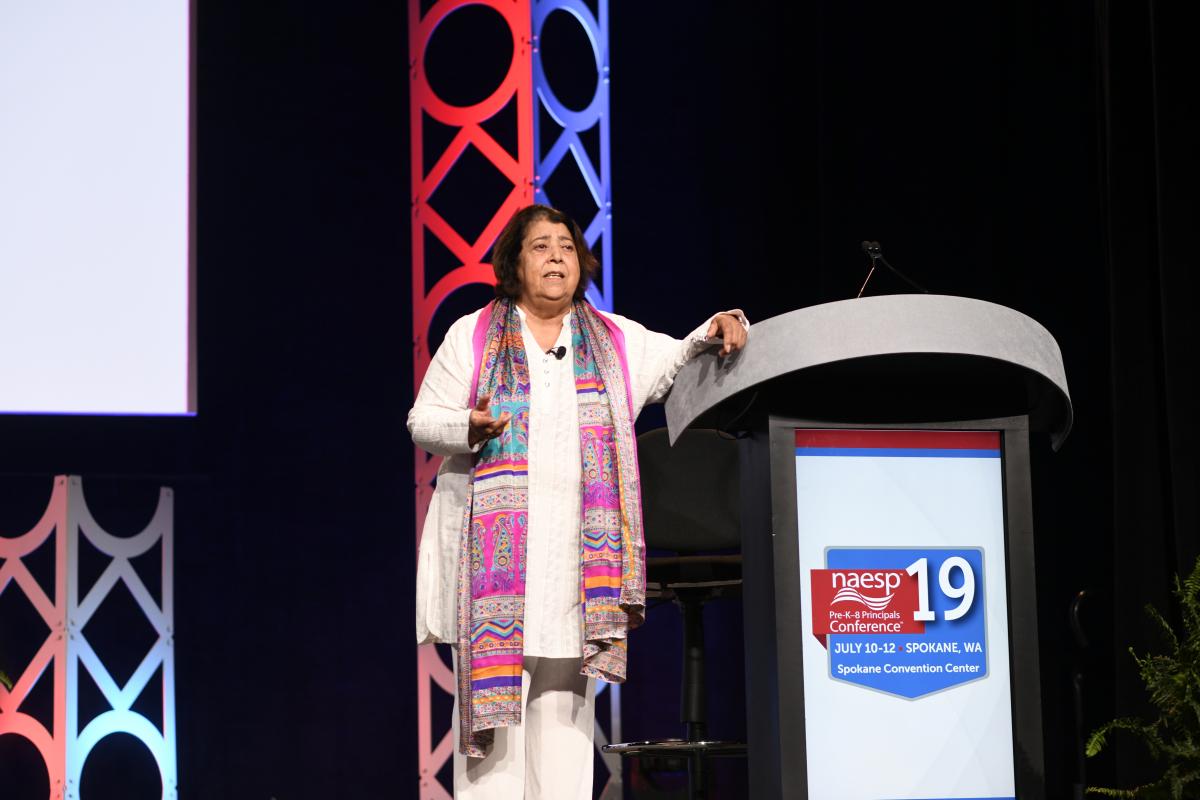Challenging Tradition
Razia Jan has made it her life’s mission to improve the lives of women and children in Afghanistan and around the world.
Razia Jan has made it her life’s mission to improve the lives of women and children in Afghanistan and around the world.
By Julie Bloss
Communicator
July 2019, Volume 42, Issue 11
Razia Jan speaking to attendees at the annual Conference’s opening keynote presenation. Photo courtesy of Lifetouch®.
As Razia Jan, wearing crisp white attire, walked onto the stage of the opening general session at the 2019 NAESP Pre-K–8 Principals Conference in Spokane, Washington, her mere presence stilled the audience of more than 1,100 principals and other leaders in education. A world-renowned humanitarian, a CNN Top 10 Hero, and the founder of Razia’s Ray of Hope Foundation, Jan took the opportunity to share her courageous, personal journey—a path that has been devoted to helping others. She captivated the crowd with a passionate story detailing how she has dedicated her existence to improving the lives of women and children in her home country of Afghanistan.
Embracing Differences
Challenging tradition, judgment, and a myriad of bias, Jan summons all people to “share commonalities and embrace differences.” Such a statement might seem simplistic in nature, but it takes on complex and powerful meaning in Afghanistan, where women’s rights have been of international concern for over the past 30 years. Among the concerns are violence against women, forced marriages for women and even young girls, a lack of education for young girls, and high suicide rates among women.
Change Through Education
Jan shared that after the Sept. 11, 2001, attack on the U.S., she was moved to become actively involved to support global change by promoting education and opportunity for girls and young women. Beginning by providing blankets at Ground Zero to workers, sending care packages to troops, and leading a coordinated effort with Operation Shoe Fly, Jan provided more than 30,000 pairs of shoes to children in Afghanistan.
This was only the start for Jan, who only works harder when faced with opposition of basic human rights for all young women and girls. Recognizing that true change cannot occur without education, Jan built a school just for girls, initially serving 100 students. Since then, the school has grown to more than 700 students and is about to graduate its first class of students—young women whose curriculum has focused on helping them understand where they are from in order for them to fully understand their foundational rights. Girls who go to school and stay in school are more likely to find jobs, get married at an older age, have fewer children, and earn more for their families and their communities. Education reaches beyond human rights, fulfilling personal needs and responsibilities.
Takeaways
Reflecting on the session, I still hear the strength in Jan’s voice: “We all are servants. We all have to give.” As elementary and middle-level school principals, we each face battles and biases—spoken and unspoken—in our communities and in our profession.
Our students rely on us to promote the same mission that Jan’s nonprofit organization Razia’s Ray of Hope promotes in Afghanistan. We must go forward. Collectively, the work we are doing as principals has the capacity to make a real difference in the world by promoting change, acceptance, and a better life for all students. In Jan’s words: “Education is giving opportunity … to live. Each drop of water makes a river. Each child is a drop of water.”
Julie Bloss is principal of Grove Early Childhood Center in Grove, Oklahoma.
—
Copyright © 2019. National Association of Elementary School Principals. No part of the articles in NAESP magazines, newsletters, or website may be reproduced in any medium without the permission of the National Association of Elementary School Principals. For more information, view NAESP’s reprint policy.


